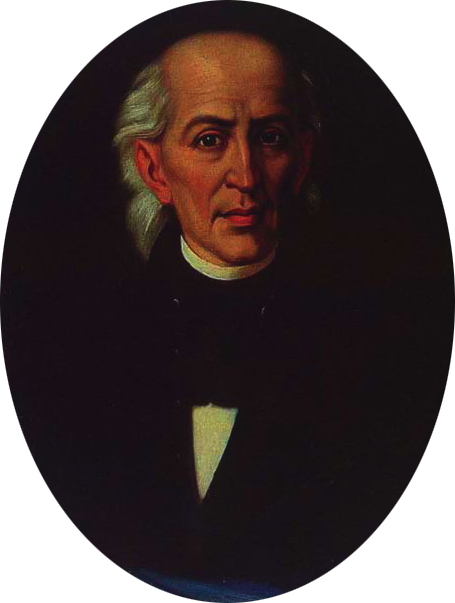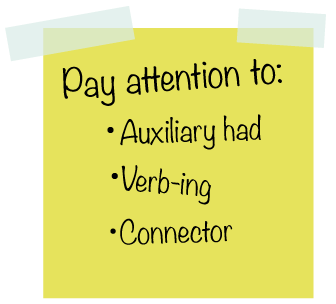All humans had been created equal, but…How do Independence movements begin? Why? Do you know how the American Independence movement began? Do you remember how the Mexican Independence started? Through this topic you will travel in time:

Unsplash. (2015). Memorial. [Photo] Retrieved from: https://pixabay.com/es/bandera-estados-unidos-memorial-828775/
At the end of this topic, you will use the past perfect continuous to name events in Mexican and American Independence. These events occurred in progress or repetitively before another event.
You will learn some interesting facts about the Thirteen Colonies and New Spain and how their brave and intelligent people fought and gained their independence.
As it was mentioned before, the Present perfect continuous will help you to travel in time.
There are different ways to express the past.
Here, you will focus only on the Past Perfect Continuous. Please revise the following information:
According to Clanfield and Benne (2011:138), the Past Perfect Continuous is used to describe “actions that were in progress at an earlier time in the past”. In other words, an action that was in progress BEFORE another event in the past. We use this structure to emphasize the duration of the first action.
For example:
They had been working peacefully before the measures taken by the Crown.
The affirmative form is used to state that an action or event was in progress or was occurring repetitively before another action occurred. The emphasis is placed on the action in progress in the past.
For example:
Relations had been deteriorating between the colonies and the mother country (since 1763) before Parliament enacted the stamp act in 1765.
Let’s break it down:
| Relations Subject |
+ |
had been deteriorating had been verb-ing |
before connector |
+ |
Parliament enacted the stamp act. complement |
Subject |
had been |
Verb -ing |
You can also make negative sentences:
Subject |
had been |
not |
Verb -ing |
The interrogative form is as follows:
Had |
subject |
been |
Verb -ing |
Question mark |
What is past perfect, then? When is it used?
It’s a structure used to indicate one action that occurred before another action (or event) in the past. However, there is NO EMPHASIS IN THE DURATION of the action that happened before.
Example:
“By the time that the Declaration of Independence was adopted in July 1776, the Thirteen Colonies and Great Britain had been at war for more than a year.”
Which action occurred first? Answer: the Thirteen Colonies and Great Britain had been at war… (Past perfect)
Exercise 1

Educar, Chile. (2006). 13 colonias. [image] Retrieved from: https://upload.wikimedia.org/wikipedia/commons/8/84/13colonias.jpg
What had been happening in North America before their Independence from Great Britain?
You will read the following passage and find out. Once you finish decide if the following statements are true or false. It will not be part of the grade, but it will help you to practice the past perfect.

Activity 1
In this activity, you will revise how the Mexican Independence Movement started. The past perfect continuous verb tense, which is used to show that an action started in the past and continued up to another point in the past. You will read the question and choose from the three options given.
Miguel Hidalgo y Costilla, known as the Father of the Mexican Independence, was the founder of the independence movement.

Thecircle. (2012). Miguel Hidalgo y Costilla. [image]. Retrieved from: https://es.wikipedia.org/wiki/Archivo:Miguel_Hidalgo.png
According to the New World Encyclopedia (see references) the Roman Catholic priest had been promoting the idea of an uprising against wealthy Spanish land-owners, and the foreign aristocrats soon after he graduated as a priest.
Some sources such as "Causes of the Mexican War of Independence" (see references) claim that he had been reading some books of the Enlightenment period. He had also been participating in a literary club in Querétaro where he had been meeting in secrecy with some other Criollos or Creole (Spaniards born in New Spain) who were dissatisfied with the reforms brought to New Spain. Notably, they were unhappy about the Peninsulares—Spaniards born in Spain--ruling the colony. One of these reforms was the increase in tax from 4 to 6%. For example, the Spanish Crown demanded more oppressive measures, for instance, seize the Church's land and sell it to finance debts in Europe, the war against the French in 1808.
Creole's interests would suffer, and Hidalgo's properties would also be affected. Before the reforms, 60% of the members of the Audiencia judges were Creole; after the reforms, only 12% were Creole, who felt insulted by the decisions taken by the Crown.
Criollos or Creole had been working hard for the Crown and the New Spain, and now they were practically left aside by Peninsulares who had just arrived from Europe.
By that time, The United States had separated from Great Britain (1776), the French Revolution had begun (1789-1799) and succeeded. Haiti had fought and defeated the French and declared their independence (1791-1804), and the British had been expelled from Buenos Aires (1806). We can infer that there was a "Yes-we- can" feeling in the New Continent.
The "literary club" in Querétaro was betrayed, and Hidalgo had to take action. The Club had planned the start of the movement for December 8, 1810. However, due to the change of events, something had to be done. So Hidalgo gave the "Grito" or the call for revolt against the "bad government" the night of September 15. At daybreak, the people's army would begin their journey to Guanajuato, to fight the great battle.
Victories would come, as well as defeats came in the new army (insurgents). Hidalgo was found guilty of treason and would be executed on July 31, 1811, by the royal army.
Adapted from
Mexican War of Independence. (2014). New World Encyclopedia. Retrieved from: http://www.newworldencyclopedia.org/p/index.php?title=Mexican_War_of_Independence&oldid=984965.
and
PREZI. (2013). Causes of the Mexican War of Independence. Taken from Prezi. Retrieved For: https://prezi.com/h_co8fk0riyk/causes-of-the-mexican-war-of-independence/

Activity 2
In this activity, you will learn how the movement continued and ended. Read the questions, listen to the recording and select True or False. Later on, you can know your results. To hear the audio click on the play button.

Activity 3
Additionally, once you listened to the audio, analyse the timelines below. Select one that best corresponds to the information you heard, then writes four sentences using the Past Perfect Continuous.
Time to send your views!
Once you have selected the timeline that matches the events according to the audio, write your sentences by checking the following elements:


Activity 4
Do you know what had been happening before the beginning of the Mexican War of the Independence movement?
What had Hidalgo, Morelos, Leona Vicario, la Corregidora…been doing?
Why did the “Criollos” rebel against the Spanish crown?
Write a composition between 120-150 words on the events that occurred before Mexican independence.
Follow the example:
Miguel Hidalgo has been hosting some meetings to discuss the revolution against the government.
Jose María Morelos had been leasing the cities of Oaxaca and Acapulco.
Consider also using negative and interrogative sentences. Use the rubrics and evaluate your work.

Activity 5
What do you consider are the causes of an independent movement?
What had been happening before the Mexican or American revolt?
What had they been trading with, having fun with, working on?
Imagine you are asked to give a talk in English for students of Prepa 9 about one of the following topics:

You will provide your point of view of how things happened. Make sure you use the Past perfect continuous in negative and interrogative sentences.
You will speak for some 4 minutes about the two countries. Follow the example in this audio:
Example
Please check the rubric below so you have a clear idea on the evaluation of this task so you can check your performance.
Are the following sentences grammatically correct? The past perfect continuous emphasizes the duration of an event that occurred in the past before past another action.
• Past perfect continuous
http://www.englishpage.com/verbpage/pastperfectcontinuous.html
• https://www.ecenglish.com/learnenglish/lessons/past-perfect-continuous
• The Thirteen Colonies
http://ahistoryofhistory.weebly.com/
• The Independence of the United States
https://youtu.be/u2xwoFhkVTo
• The Independence movement of Mexico
https://youtu.be/hJlQ6SfXxQI
• Noll, A. (1890). A Short History of Mexico. A.C. McClurg & Co: Chicago, IL.
• A Short History of Mexico. PDF/epub https://archive.org/stream/ashorthistoryme01nollgoog#page/n162/mode/1up
• John Adams, the Declaration of Independence
• https://www.youtube.com/watch?v=JWXmsUzopqM